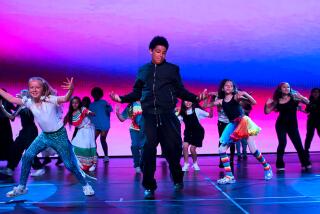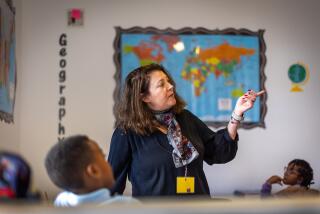The ‘3 Rs’ Plus an Imagination Equal an Education : Children: Dance teacher exposes preschoolers to the arts ‘to stimulate the creative process inherent in every child.’
- Share via
At the Polly Dodge Day-Care Center in Manhattan, a dozen 5-year-old children ice skate to waltz music. Squealing with delight, they twirl and spin and leap high in the air. The only things missing are the ice and the skates.
“I doubt that many of these children have yet been ice skating, but all of them have seen it on television,” says Elizabeth Bernard Pettit, founder and director of the School for Education in Dance. “Imaginary play is one of many devices that we use through the arts to stimulate the creative process inherent in every child.”
Pettit, who has a degree in psychology and has danced with Martha Graham, started the school 11 years ago. She and one of her staff of 15 teachers instruct at day-care centers, schools and libraries around New York City.
At the Polly Dodge Center, the children are introduced to beautiful paintings and music, a little tumbling and discussions about good nutrition. For most of these children, this once-a-week hourly session is a joyous break in a day that begins at 8:30 and ends at 6, week after week.
As the children take off their imaginary skates, a rag by Scott Joplin plays in the background. Pettit encourages the youngsters to tap their feet, clap their hands and move, move, move.
“Scott Joplin was a black American jazz composer,” Pettit’s voice rises over the music. “He was a genius, darlings!”
Many of the schools where Pettit teaches are affluent. In those schools, she is able to teach twice a week.
“Some of these children from the wealthier schools are disadvantaged, too,” Pettit said in a recent interview. “They have parents that work all the time. They spend long days with nannies who never get down on the floor to play or encourage any kind of exploration.”
Pettit says studying dance, art and music should not take a back seat to any of the academic subjects that are taught. “The arts curriculum in most schools across the country is set aside for after-school programs,” she says. “If children see that, then it becomes less important.”
Recently Pettit was asked to take her work to the Prospect Family Inn Day-Care Center in the South Bronx, a privately funded not-for-profit organization that takes children off the streets and from shelters.
“In Europe, every child, no matter how poor, is exposed at an early age to music and art,” Pettit says.
“The arts give children the opportunity to use that creative sparkle that is in all of us. That sparkle will get them through this tough world,” Pettit says. “If it’s sublimated, then a tool is lost to teach them how to lead productive lives.”
More to Read
The biggest entertainment stories
Get our big stories about Hollywood, film, television, music, arts, culture and more right in your inbox as soon as they publish.
You may occasionally receive promotional content from the Los Angeles Times.










